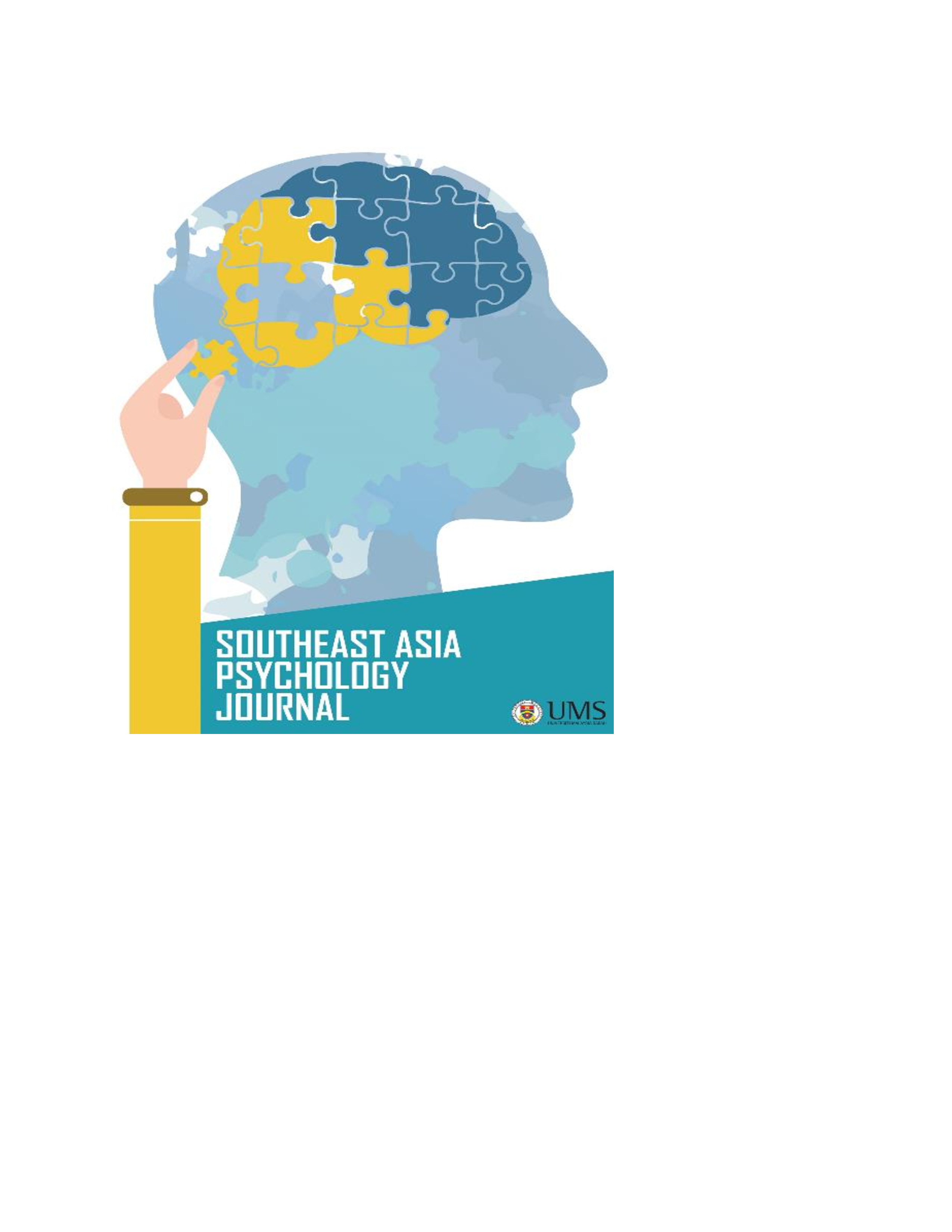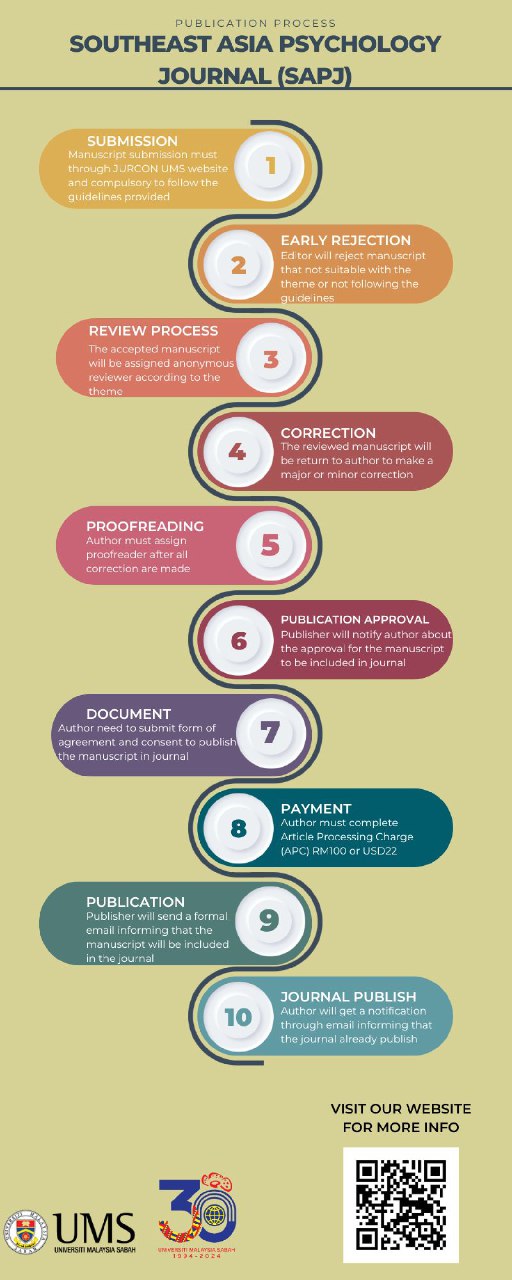Impak Teknologi Maklumat Dan Komunikasi Terhadap Kesihatan Mental: Kajian Literatur
DOI:
https://doi.org/10.51200/sapj.v12i1.5072Keywords:
Teknologi Maklumat Dan Komunikasi (TMK), Kesihatan Mental, Kajian LiteraturAbstract
Kemunculan Teknologi Maklumat dan Komunikasi (TMK) telah membawa perubahan besar dalam pelbagai aspek kehidupan moden, termasuk kesannya terhadap kesihatan mental. Kertas kajian literatur ini membentangkan penerokaan menyeluruh berkenaan hubungan di antara TMK dan kesihatan mental dalam era digital kontemporari. TMK yang meluas telah mengubah cara individu dan masyarakat berinteraksi, bekerja dan mengakses maklumat namun faedah TMK tidak dapat dinafikan, kebimbangan yang semakin penting telah timbul di sekeliling serta potensi kesannya terhadap kesihatan mental. Melalui lensa antara disiplin, objektif kajian ini menganalisis pelbagai cara di mana TMK mempengaruhi kesejahteraan mental, merangkumi aspek positif dan negatif. Dengan menggunakan pelbagai sumber ilmiah, artikel ini mensintesis bukti empirikal, rangka kerja teori dan kajian kes untuk menjelaskan kesan teknologi digital terhadap kesihatan psikologi, keterkaitan sosial dan pengalaman emosi. Dengan menyelidik mekanisme yang mendasari kesan ini, makalah ini memberikan pandangan tentang cabaran yang ditimbulkan oleh lensa masa TMK yang berlebihan, interaksi sosial dalam talian, buli siber dan ketagihan digital. Pada masa yang sama, ia menonjolkan potensi TMK sebagai platform untuk sokongan kesihatan mental, penyampaian terapi dan kempen kesedaran. Metodologi dalam kajian ini adalah menggunakan pangkalan data carian Connected Paper, Mendeley dan Google Scholar serta menggunakan istilah carian “impak positif TMK”, “impak negatif TMK” dan “kesan TMK terhadap kesihatan mental”. Dapatan kajian menunjukkan bahawa terdapatnya hubungan antara TMK dan kesihatan mental menunjukkan interaksi kompleks pengaruh positif dan negatif terhadap kesejahteraan psikologi. Melalui ulasan kritikal, kertas kerja ini menyumbang kepada pemahaman yang lebih terperinci tentang interaksi terperinci antara TMK dan kesihatan mental, menawarkan asas untuk pengesyoran dasar, pertimbangan etika, dan hala tuju penyelidikan masa depan dalam memanfaatkan teknologi untuk menggalakkan kesejahteraan psikologi.
References
Alhejaili, R. (2023). Wearable Technology for Mental Wellness Monitoring and Feedback (Doctoral dissertation, Queen Mary University of London).
Almourad, M. B., McAlaney, J., Skinner, T., Pleya, M., & Ali, R. (2020). Defining digital addiction: Key features from the literature. Psihologija, 53(3), 237-253.
Amichai-Hamburger, Y. (2008). Potential and promise of online volunteering. Computers in Human Behavior, 24(2), 544-562.
Barragán Martín, A. B., Molero Jurado, M. D. M., Pérez-Fuentes, M. D. C., Simon Marquez, M. D. M., Martos Martínez, Á., Sisto, M., & Gazquez Linares, J. J. (2021). Study of cyberbullying among adolescents in recent years: A bibliometric analysis. International journal of environmental research and public health, 18(6), 3016.
Baumel, A., Edan, S., & Kane, J. M. (2019). Is there a trial bias impacting user engagement with unguided e-mental health interventions? A systematic comparison of published reports and real-world usage of the same programs. Translational behavioral medicine, 9(6), 1020-1033.
Best, P., Manktelow, R., & Taylor, B. (2014). Online communication, social media and adolescent wellbeing: A systematic narrative review. Children and Youth Services Review, 41, 27-36.
Donnelly, J., Dunne, P. J., Laiti, J., Loughnane, C., & O'Donovan, R. (2023). Digital positive health Platforms, supported by artificial intelligence, measured using wearable devices. In Routledge International Handbook of Positive Health Sciences (pp. 266-281). Routledge.
Elhai, J. D., Yang, H., & Montag, C. (2020). Fear of missing out (FOMO): overview, theoretical underpinnings, and literature review on relations with severity of negative affectivity and problematic technology use. Brazilian Journal of Psychiatry, 43, 203-209.
Floridi, L. (2014). The fourth revolution: How the infosphere is reshaping human reality. OUP Oxford.
Hasbie, S. N. R., Adam, M. I. S., Assim, S. I. T., & Anuar, F. N. (2023). Information and Communication Technology (ICT) Adoption and Community: A Systematic Literature Review. International Journal of Academic Research in Business & Social Sciences, 13(15), 153-167.
Hassan, H. M., Salleh, M. A. M., & Ahmad, A. L. (2021). Keibubapaan Digital dan Mediasi Ibu Bapa Terhadap Penggunaan Internet Remaja di Malaysia. Malaysian Journal of Social Sciences and Humanities (MJSSH), 6(8), 121-132.
Haque, M. R., & Rubya, S. (2022). " For an app supposed to make its users feel better, it sure is a joke"-an analysis of user reviews of mobile mental health applications. Proceedings of the ACM on Human-Computer Interaction, 6(CSCW2), 1-29.
Hudimova, A., Popovych, I. H. O. R., Savchuk, O. L. E. K. S. A. N. D. R., Lіashko, V. E. R. A., Pyslar, A. N. A. T. O. L. I. I., & Hrys, A. N. T. O. N. I. N. A. (2021). Research On The Relationship Between Excessive Use Of Social Media And Young Athletes’physical Activity.
Lehmann, S. (2021). Growing biodiverse urban futures: Renaturalization and rewilding as strategies to strengthen urban resilience. Sustainability, 13(5), 2932.
Leu, D. J., Kinzer, C. K., Coiro, J. L., & Cammack, D. W. (2004). Toward a theory of new literacies emerging from the Internet and other information and communication technologies. Theoretical models and processes of reading, 5(1), 1570-1613.
Li, X., Buxton, O. M., Lee, S., Chang, A. M., Berger, L. M., & Hale, L. (2019). Sleep mediates the association between adolescent screen time and depressive symptoms. Sleep medicine, 57, 51-60.
Lissak, G. (2018). Adverse physiological and psychological effects of screen time on children and adolescents: Literature review and case study. Environmental research, 164, 149-157.
Malhotra, P., Singh, Y., Anand, P., Bangotra, D. K., Singh, P. K., & Hong, W. C. (2021). Internet of things: Evolution, concerns and security challenges. Sensors, 21(5), 1809.
Manyerere, D. J. (2021). Youth Perceptions, Use and Effects of social media on Peace and Conflicts in Tanzania. Ghana Journal of Development Studies, 18(2), 48-73.
Marciano, L., Vocaj, E., Bekalu, M. A., La Tona, A., Rocchi, G., & Viswanath, K. (2023). The Use of Mobile Assessments for Monitoring Mental Health in Youth: Umbrella Review. Journal of Medical Internet Research, 25, e45540.
Martin, W. J. (2017). The global information society. Taylor & Francis.
Miller, D. (2020). Social networking sites. In Digital anthropology (pp.146
-161). Routledge.
Ramírez, S., Gana, S., Garcés, S., Zúñiga, T., Araya, R., & Gaete, J. (2021). Use of technology and its association with academic performance and life satisfaction among children and adolescents. Frontiers in Psychiatry, 12, 764054.
Pham, Q., Khatib, Y., Stansfeld, S., Fox, S., & Green, T. (2016). Feasibility and efficacy of an mHealth game for managing anxiety:“flowy” randomized controlled pilot trial and design evaluation. Games for health journal, 5(1), 50-67.
Pongutá, D. A. G., & Pérez-Cárdenas, L. V. (2023). Cultivating Digital Citizenship and Peaceful Virtual Interactions through a Cyberbullying Prevention Initiative. Migration Letters, 20(S5), 1156-1173.
Ryan, J., Edney, S., & Maher, C. (2019). Anxious or empowered? A cross-sectional study exploring how wearable activity trackers make their owners feel. BMC psychology, 7, 1-8.
Salman, M., Asif, N., Mustafa, Z. U., Khan, T. M., Shehzadi, N., Hussain, K., & Khan, M. T. (2020). Psychological impact of COVID-19 on Pakistani university students and how they are coping. Medrxiv, 2020-05.
Seo, H., & Myeong, S. (2020). The priority of factors of building government as a platform with analytic hierarchy process analysis. Sustainability, 12(14), 5615.
Sharma, P. (2019). Digital revolution of education 4.0. International Journal of Engineering and Advanced Technology, 9(2), 3558-3564.
Squire, K. (2009). Mobile media learning: multiplicities of place. On the Horizon, 17(1), 70-80.
Tandon, A., Dhir, A., Almugren, I., AlNemer, G. N., & Mäntymäki, M. (2021). Fear of missing out (FoMO) among social media users: a systematic literature review, synthesis and framework for future research. Internet Research, 31(3), 782-821.
Worden, J. W. (2018). Grief counseling and grief therapy: A handbook for the mental health practitioner. springer publishing Company.
Yavich, R., Davidovitch, N., & Frenkel, Z. (2019). Social Media and Loneliness--Forever Connected?. Higher Education Studies, 9(2), 10-21.
Zaki, N. A., Wahab, R. A., & Niri, M. A. (2020). Kesan Revolusi IR 4.0 Terhadap Perkembangan Dan Ketepatan Aplikasi Kiblat Dalam Telefon Pintar: The Effect of Industrial Revolution 4.0 on the Development and Accuracy of the Qiblah Application in Smartphones. Jurnal Fiqh, 17(2), 267-308.








